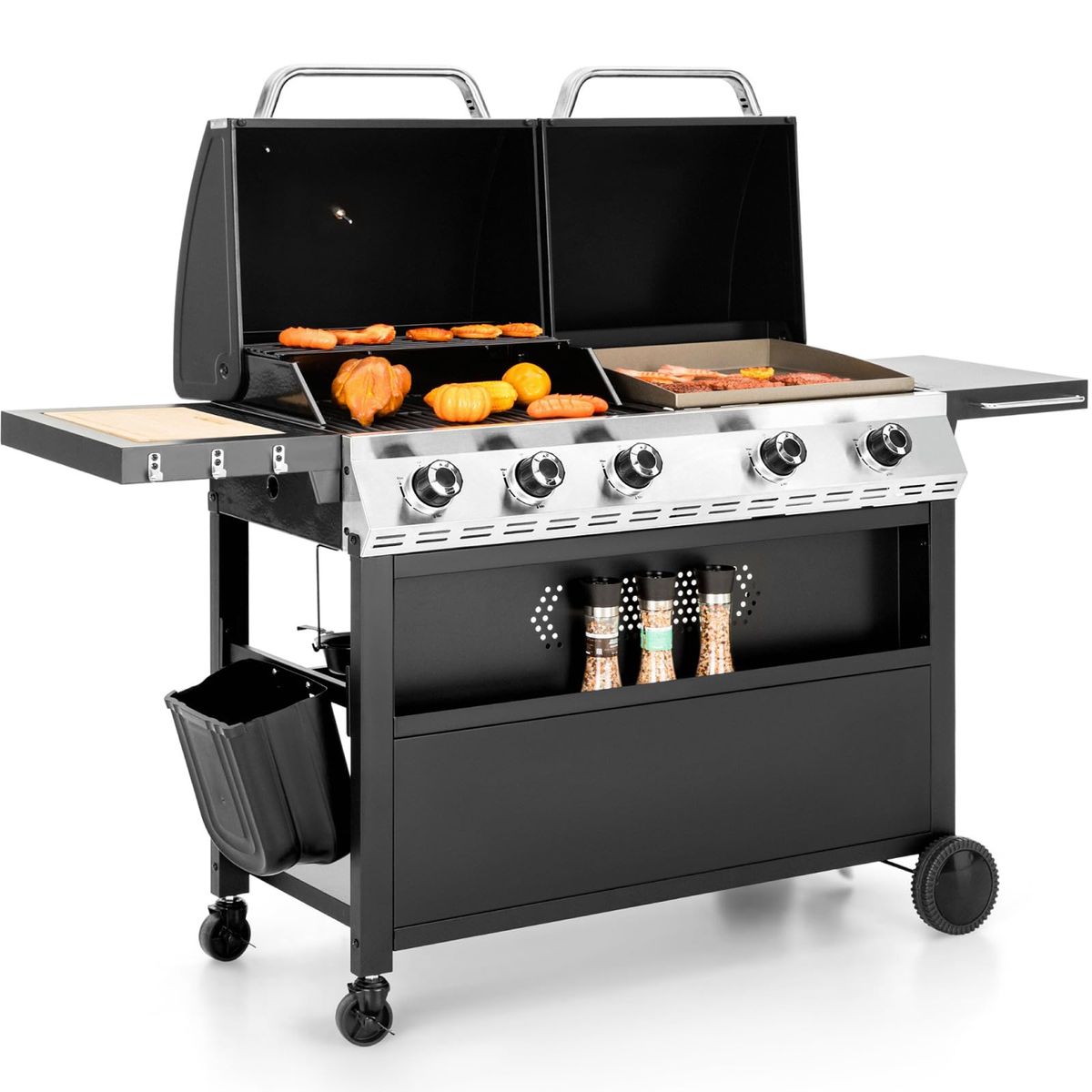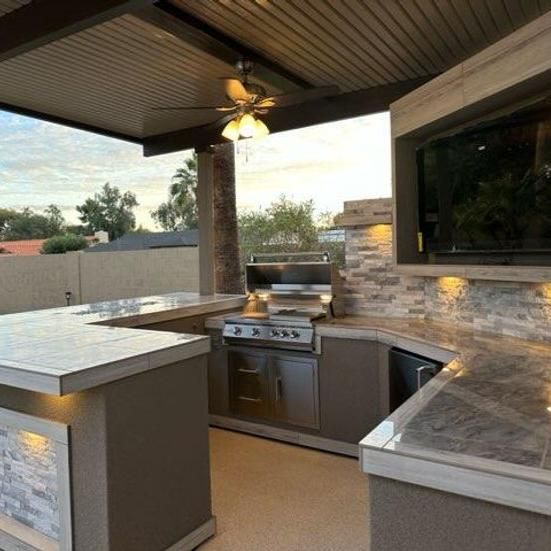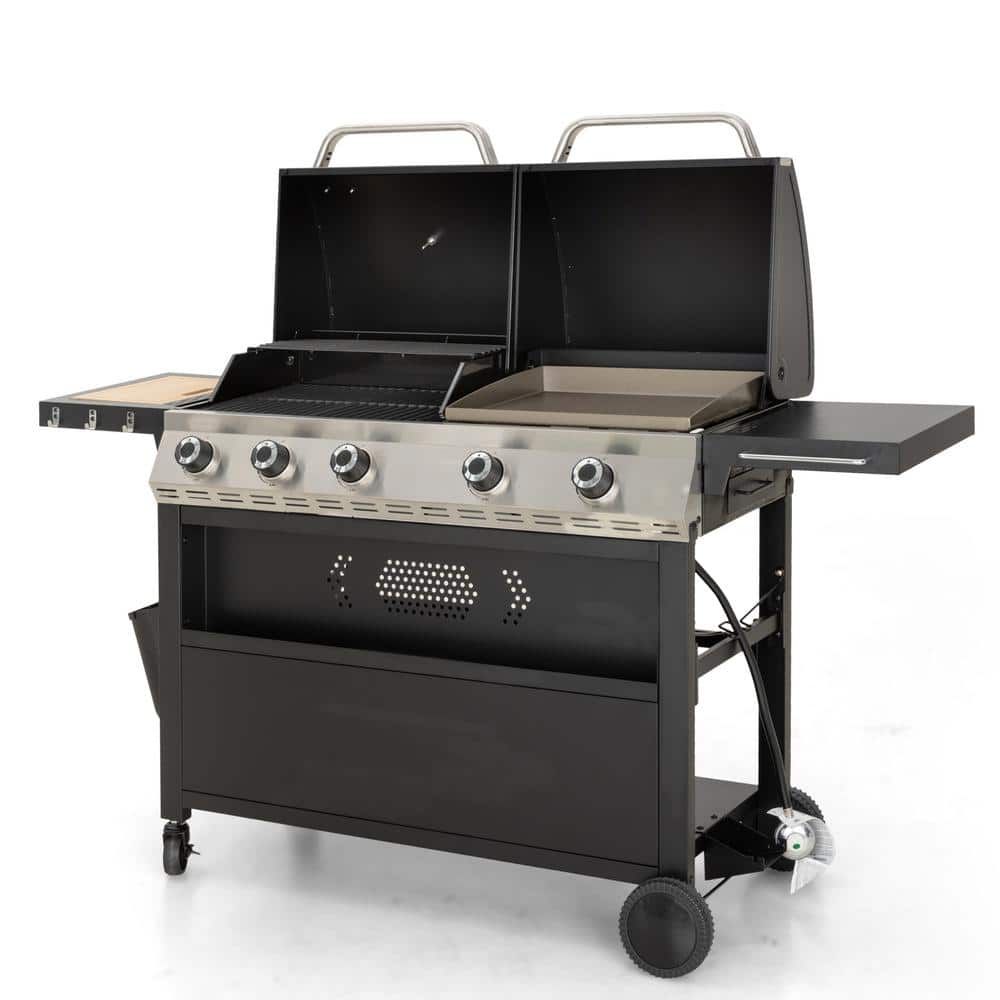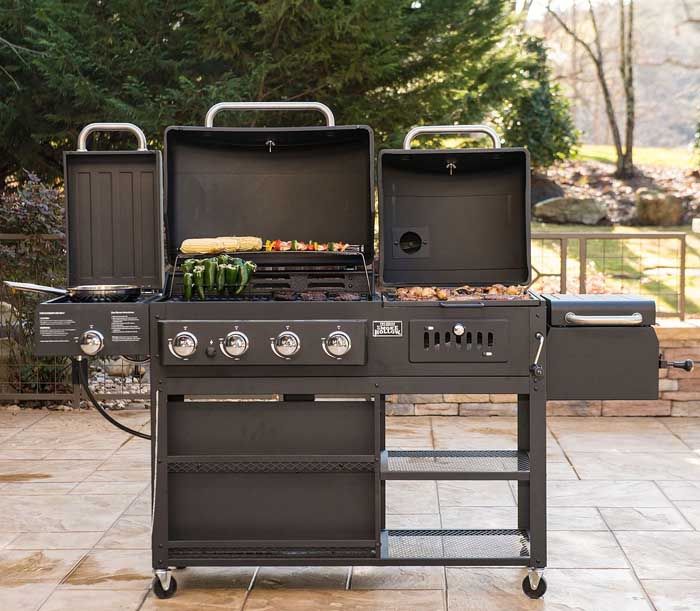
Grill lovers argue every summer about which fuel is best. Some choose charcoal for its smoky flavor. Others pick gas for its speed and ease. The truth is both sides have strong points and real limits that shape your cooking.
Charcoal grills give smoky taste and higher heat, while gas grills give faster start-up, easy control, and cleaner cooking. The right choice depends on taste, time, cost, and lifestyle.
Both grill types bring different results to your backyard table. To decide which one is right for you, you need to know how they compare in flavor, setup, cost, and safety. The sections below take each point step by step so you can choose with confidence.
Pros of Charcoal Grills
Grilling with charcoal has been the classic way for decades. Many people love it because it feels traditional and adds a flavor that gas cannot fully copy.
Charcoal grills reach higher heat and create smoky taste, making them the best choice for deep sear marks and strong barbecue flavor.
Heat and Flavor
Charcoal burns hotter than gas. This means you can achieve searing temperatures above 700°F. At these levels, steaks and burgers get crisp edges and bold grill marks. When fat drips onto hot coals, smoke forms and returns to the food, adding another layer of taste. This process is part of why charcoal meals are remembered by guests.
Charcoal also gives flexibility for low and slow cooking. You can arrange the coals for direct heat on one side and indirect heat on the other. This makes it possible to cook ribs or pork shoulders for hours. Gas can also slow cook, but charcoal adds that extra smoked character.
Cost and Accessibility
A simple charcoal grill can be bought for as low as \$40. This makes it the cheapest way to enter the grilling hobby. Bags of briquettes are easy to find at local stores. Many families also keep a kettle grill in their garage for quick weekend meals.
Still, cost grows over time. A 20-pound bag of charcoal might last only a few cooks. That means long-term expenses are higher than a propane tank that can last weeks.
Table: Key Strengths of Charcoal Grills
| Feature | Advantage |
|---|---|
| Heat | Reaches very high searing levels |
| Flavor | Produces smoke that adds taste |
| Setup | Simple to buy and assemble |
| Portability | Small kettle grills are easy to move |
| Initial Cost | Very low compared to gas grills |

Charcoal is not for everyone, but for people who enjoy smoky taste and grilling as a slow activity, it remains the top pick. Families who value tradition often see charcoal as part of the barbecue ritual.
Cons of Charcoal Grills
While charcoal creates memorable flavor, it also comes with clear downsides that can frustrate beginners or anyone short on time.
Charcoal grills take longer to heat, cost more in fuel over time, and create messy cleanup with ash and dust.
Time and Effort
It takes around 20 minutes for charcoal to reach cooking temperature. Gas grills, by contrast, can be ready in less than 10 minutes. This delay can be inconvenient when cooking after work or during a busy event. Charcoal also requires extra tools like chimneys, lighter cubes, or fluid to start the fire.
Cleanup and Safety
After cooking, the grill is filled with ash. This ash must cool before it can be removed, making cleanup a longer task. Gas grills only need a quick brush on the grates.
Safety can also be an issue. Sparks can blow in windy conditions. Hot coals remain active for hours after cooking ends, which can be risky if children or pets are nearby.
Fuel Cost
Charcoal might look cheap at first, but repeated purchases add up. Clean-burning lump charcoal can be expensive. A propane tank often lasts longer, making gas cheaper in the long run.
Table: Downsides of Charcoal Grills
| Weakness | Impact on Use |
|---|---|
| Heat-up Time | 15–20 minutes before cooking starts |
| Cleanup | Ash removal required every session |
| Fuel Cost | Bags run out quickly, especially for long cooks |
| Safety | Hot ash and sparks create risks |
| Consistency | Harder to keep stable temperature |
These limits show why charcoal is not always the right fit. If you want speed and convenience, gas might feel much better for your cooking needs.
Pros of Gas Grills
Gas grills are now the most popular option in many homes. They appeal to people who want convenience, control, and steady results.
Gas grills heat up in minutes, give precise temperature control, and are easier to clean, making them ideal for frequent backyard use.
Fast Start and Control
Gas grills ignite with the turn of a knob. Preheating takes 5–10 minutes. This makes it easy to cook on weeknights or when guests arrive without waiting.
Control knobs allow quick changes in heat levels. You can go from searing steaks at high heat to simmering vegetables at low heat with a twist. This level of control is hard to match with charcoal.
Cleaner Cooking and Environment
Gas cooking produces fewer carcinogens than charcoal. It also has a smaller carbon footprint, about one-third of charcoal’s. This makes it a healthier and more eco-friendly option.
Gas grills also have grease trays instead of ash piles. This makes cleaning faster and less messy.
Versatility and Add-ons
Gas grills often come with side burners, storage shelves, rotisserie kits, and lights. These features turn the grill into a full outdoor kitchen tool. Charcoal units rarely offer these extras.
Table: Key Strengths of Gas Grills
| Feature | Advantage |
|---|---|
| Start-up | Ready in under 10 minutes |
| Control | Heat adjusted by turning knobs |
| Cleaning | Simple grease tray instead of ashes |
| Environment | Lower carbon footprint |
| Extras | Side burners, lights, rotisserie options |

Gas is the practical choice for most families. It combines speed, control, and features that suit busy modern lifestyles.
Cons of Gas Grills
Gas grills do many things right but they are not perfect. Buyers should also know the drawbacks before choosing.
Gas grills are more costly, larger to move, and less smoky in taste compared to charcoal grills.
Higher Price
A basic gas grill starts around \$200. Mid-range or premium models with stainless steel construction or multiple burners can go well beyond \$800. This makes the entry cost higher than charcoal.
Taste and Flavor
Gas does not naturally add smoke flavor. Food tastes cleaner but lacks the same depth as charcoal cooking. While wood chips or smoker boxes can add some smoke, they rarely match the intensity of burning coals.
Size and Mobility
Gas grills are heavy. They often include side tables, storage, and large grates. This makes them harder to move for camping or tailgates. Smaller portable gas grills exist, but they still require propane tanks and safe transport.
Safety Risks
Gas has its own safety needs. Leaking propane or improper connection can be dangerous. Grills must be kept 10 feet from houses or wooden decks. Regular checks on hoses and tanks are needed.
Table: Downsides of Gas Grills
| Weakness | Impact on Use |
|---|---|
| Cost | Higher initial purchase price |
| Flavor | Less smoky taste compared to charcoal |
| Mobility | Large and heavy, harder to transport |
| Safety | Risk of leaks if not maintained |
| Setup | Takes time to assemble a full-size model |
Gas grills give ease and control, but for those who want strong smoke flavor or low-cost cooking, charcoal might still be better.
Gas vs Charcoal: Where They Differ
Both grills share one purpose, but their performance in flavor, control, and cost separates them.
Charcoal excels in flavor and heat, while gas excels in speed, control, and convenience.
Side-by-Side Comparison
| Attribute | Charcoal Grill | Gas Grill |
|---|---|---|
| Flavor | Smoky, bold taste | Clean, mild flavor |
| Heat Control | Hard to adjust, needs skill | Easy knob control |
| Cost | Cheap to buy, costly fuel long term | Higher price, cheaper fuel |
| Setup Time | 20–30 minutes to start | 5–10 minutes |
| Cleanup | Ash removal required | Quick grease tray cleanup |
| Mobility | Portable, light models | Heavy, less portable |
| Environment | More smoke, larger footprint | Cleaner burn, less emissions |

The choice comes down to what matters most. If taste and tradition matter, charcoal wins. If speed and convenience matter, gas wins.
Conclusion
Both charcoal and gas grills give unique experiences. Charcoal brings smoky taste, high heat, and tradition, but it needs time, effort, and repeated fuel. Gas brings fast ignition, easy control, and less mess, but it costs more and lacks deep smoke.
The best choice depends on your needs. For slow weekend cooking and bold flavors, charcoal is the better option. For quick weeknight meals, clean cooking, and modern features, gas is the smarter pick. Some people even choose to own both to enjoy the strengths of each.
In the end, grilling is about gathering with people and sharing food. Whether you use charcoal or gas, the right grill is the one that helps you cook with ease and enjoy the meal together.
FAQ
What is the difference between propane and natural gas grills?
Propane is stored in tanks and denser; natural gas runs through pipelines, is lighter, and cheaper per use—switching needs proper valves and regulator adapters. (BBQGuys)
How long do gas grills usually last?
A gas grill’s lifespan depends on build quality, usage, and care—but regular cleaning and maintenance can extend its life for many years. (BBQGuys)
Can a gas grill use charcoal or vice versa?
Some hybrid or convertible models allow both fuel types with insert trays. Generally, standard gas grills can’t safely use charcoal without specific design. (BBQGuys)
What is an infrared gas grill and how is it different?
Infrared gas grills use special burners that emit intense radiant heat. They cook faster, hotter, and help retain moisture better than standard gas grills. (BBQGuys)
Does meat taste noticeably different when using charcoal versus gas?
Yes. Charcoal adds smoky, rich flavor due to aromatic compounds from coals, while gas yields a cleaner, more subtle, natural meat taste. (franksbutchershop.com)
Is charcoal grilling more harmful than gas grilling?
Gas grilling emits fewer carcinogens and has a smaller carbon footprint. Charcoal smoke may pose higher health risks, though careful fuel choices can help. (Taste of Home)
What is indirect grilling and why use it?
Indirect grilling places food beside instead of above heat—ideal for large, tough cuts. It cooks at moderate temps and reduces flare-ups for slow, even cooking. (Wikipedia)
Is it worth owning both charcoal and gas grills?
Many grillers keep both. Charcoal for strong smoky flavor and searing, gas for speed and control—it gives full flexibility.
